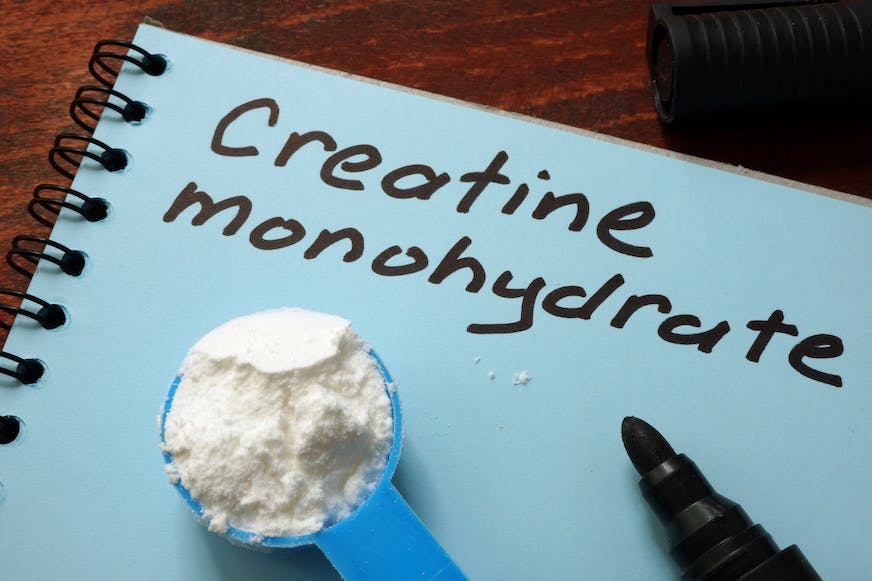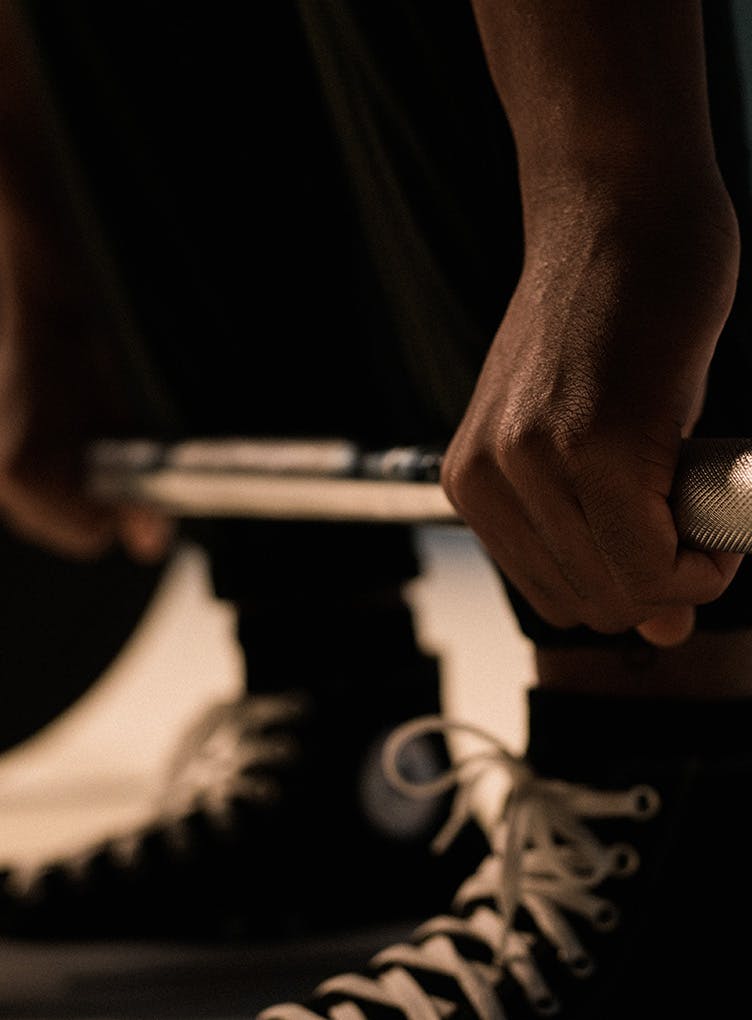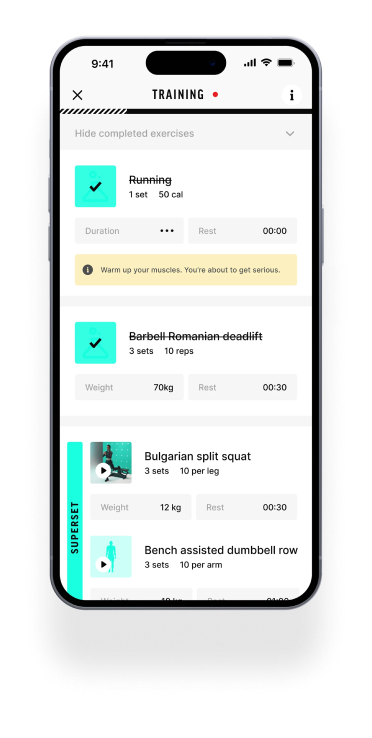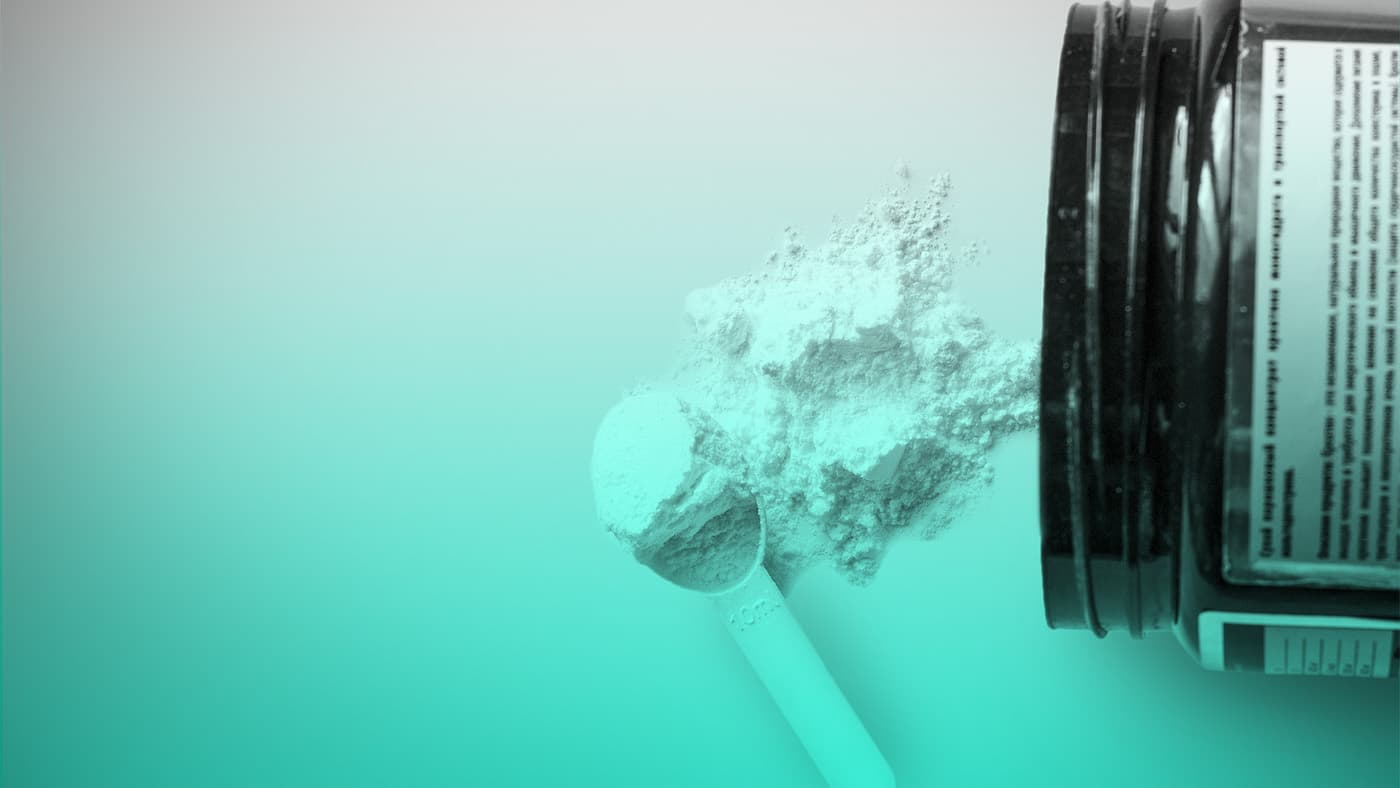Creatine monohydrate - the ultimate guide
According to the ISSN (International Society of Sports Nutrition), creatine monohydrate is the top-performing (and legal) supplement for intense sports and for building lean muscle from weightlifting.
Since 1990, there've been over 1000 (yes, you read that right!) studies on creatine. So, we can pretty much say this is the most checked-out supplement ever. In this article, I'm gonna break down the main takeaways about creatine monohydrate for you.
Creatine Monohydrate - The Super Supplement?
There's a big ol' review waiting for you here. It's totally worth the read, especially if you're into lifting weights. You'll find every bit of info linking creatine and weightlifting. Plus, I'm using loads of public scientific research, so if you wanna dive deeper, you totally can. Let's kick things off with an overview:
Quick hits: the major findings.
Creatine breakdown (making it, using it, storing it)
How creatine monohydrate boosts strength, muscle size, power, and stamina
What's happening behind the scenes
How creatine helps build muscles
How-to guide for supplements
When's the best time to take creatine?
Comparing types of creatine
Is all creatine monohydrate the same across brands?
People who react vs don't vs vegetarians
Men vs women: any difference?
Putting on weight
Quicker recovery? Better in heat? Faster bounce back after injury? Protecting our central nervous system (brain and spinal cord)?
Is creatine cool for older folks?
Side effects and staying safe
FAQ
1. Creatine - The Main Takeaways
Creatine monohydrate might just be the most researched supplement out there. Bottom line? It's a big win for people lifting weights and those in intense sports (like sprinters, b-ball players, hockey players). Here are the highlights:
Helps with muscle growth.
Gets you stronger, faster.
More energy. Like, squeeze out a few more reps in your workout.
Bounces back quicker during and post-workout or game.
Your glycogen stores go up.
All these goodies come without any nasty side effects, except a bit of weight gain.
Best to start with a loading phase and then keep it up with a smaller dose.
No real difference between the various types of creatine.
Creatine monohydrate is creatine monohydrate. Price tags? Just marketing.
And there's loads more to cover in this review.

2. Creatine Monohydrate Metabolism - Building, Breaking Down, and Storing
You'll find creatine mostly in your muscles, like 95% of it. Every day, your body breaks down about 2 grams, and it replaces about half of that by itself using the kidneys, liver, and pancreas. So, you don't have to do anything for that. The other half? You gotta get it from food. You'll mainly find creatine in red meat and food from the sea. Now, we're just talking about replacing the creatine your body uses up daily. Most of us still have some extra room to store more creatine. Vegetarians might even double their current stash because they find it harder to replace lost creatine from their diet. Even for non-vegetarians, there's usually room to store a bit more creatine. That's cool, 'cause a bit more creatine can have a pretty big impact.
3a. Creatine's Effects on Muscle Mass, Strength, Power, and Stamina
Open any study on creatine and you'll see them talking about its effects right off the bat. With creatine, you can build muscle more easily. How that works? I'll explain in the next section. You also get stronger and recover faster between sets or sprints. Lifting performance can go up by an average of 14%. Endurance for short-burst activities is better, but probably not for long-duration ones – even though it might seem like it should be since it increases the glycogen (a type of energy) stored in your muscles. You can also do more reps in total. Older folks? They too can benefit from creatine, building more muscle and strength. So, is creatine some kind of magic?
3b. How Big is Creatine's Impact?
How much of a difference does creatine make? Sure, creatine monohydrate helps with many sports performances, but how much? Hold your horses. Some big studies don't really talk about the exact amounts of muscle and strength you might gain. Some studies even say you'd gain the same amount of muscle with or without it. In one study, they say strength gains are about 8% higher in the creatine group compared to a placebo group. That might sound like a lot, but think about it: what's 8% of 3 kilos? For older folks, the average muscle gain across 22 studies was 1.37 kilos (studies ranging from 7 to 52 weeks). Probably because older peeps lose more creatine and can replace it with supplements. But how much extra muscle can a young adult build using creatine? Probably less. And if you're already really into weightlifting, the growth might be even less because you're closer to your "growth ceiling."
Every Bit Helps!
Remember, creatine isn't on the banned list for a reason. Just because it helps doesn't mean it's a game-changer. And even if it generally helps, not every study confirms this. Personally? I think every little bit counts, whether it's building muscle, getting stronger, recovering faster, or squeezing out a few more reps during workouts.
4. Behind the Power and Stamina
The big deal with creatine monohydrate is that it boosts your short-term energy: ATP. Without getting too geeky, ATP is like fuel for your muscle cells. Without it, you can't move. But ATP is heavy stuff, so your muscles can't store tons of it. During an 'all-out' effort, you'd use up all your ATP in 20-30 seconds, even with what you get from your 'creatine stash'. Basically, creatine helps you make ATP super quickly. Faster than any other way. More creatine in your muscles means you get a few extra seconds of this super-fast energy. That might let you do one more rep or sprint a bit longer. This could be the difference between first and second place in a competition.
Creatine also helps with how calcium works in your muscles, which is needed for the power they produce. That's the basic idea of how creatine lets you push a little longer and harder. Want to get more into the nitty-gritty? Check out this paper and jump to the discussion section.

5. How Creatine Contributes to Increased Muscle Growth
The mechanisms behind muscle growth are quite technical. The best explanation can be found in this research. I'll simplify it using a brake and accelerator analogy. Within your cells, there is a signaling protein called myostatin. Think of myostatin as a brake on muscle growth. The more active this substance is, the harder it is for your cells to build muscle mass. Creatine, to some extent, makes myostatin less active. In other words, creatine ensures that the brake is pressed slightly less hard. On the other hand, creatine also slightly pushes the muscle growth accelerator. This increases the activity of the molecular muscle growth mechanisms slightly. Lastly, creatine causes a 0.5-1L increase in water in your muscle cells, partly due to an increase in glycogen storage. For some people, this amount is much larger. This swelling, through the so-called muscle pump mechanism, might also contribute to muscle growth, although the effect of this mechanism isn't as well-supported.
Great stuff, that creatine! But as always, consider everything as a percentage here and there. It's not a miracle cure, and without strength training, you won't gain an ounce from just consuming creatine monohydrate, apart from the water increase.
6. Supplementation Protocols - Taking Creatine with or without a Loading Phase?
Now that you know creatine has a positive effect on your training and isn't a magic bullet, it's interesting to see how best to consume it. With or without a loading phase. With water or carbohydrates?
Option 1: Load for 5 days - then maintain
Almost all studies agree that it's best to start with a 5-7 day loading phase. During the loading phase, take 4 doses of 5 grams of creatine monohydrate daily. Specifically, ensure you consume about 0.3 grams per kilo of body weight per day (70 kg x 0.3 = 21 grams). This quickly fills up your not yet fully stocked storage. Then maintain this max storage with 3-5 grams of creatine daily. Some large athletes even need 5-10 grams per day during the maintenance phase. And for those with certain medical issues, even more is recommended (I won't delve into this since I'm not a medical expert, and you should consult with your doctor).
Option 2: Gradually build up creatine storage
Another method is the gradual buildup. Consuming 3-6 grams of creatine monohydrate daily takes 21-28 days before your creatine warehouse is fully stocked. This is seen as a less efficient way to build up.
Option 3: 100 times 1 gram of creatine?
An even more effective loading method according to one study is to take 20 grams of creatine for 5 days, divided into 20 doses of 1 gram (one gram every half hour). This should lead to a 13% higher uptake. Personally, I don't think this is the most user-friendly method. Read on before you think that extra 13% is superior.
Loading phase is not a marketing gimmick.
I often hear in the gym that the loading phase is a marketing gimmick by supplement sellers. This is not true. It simply results in the fastest increase in your creatine storage.
Increased uptake by combining creatine with carbohydrates?
It's commonly said that you should combine creatine with a source of carbohydrates, like fruit juice, because it allows you to store even more creatine in your muscles. This has been demonstrated in studies with shakes containing between 50 and 100(!) grams of carbs per dose. This means an increase of 800 to 1600 kcal daily during loading days. By the end of the week, in addition to (slightly) more creatine, you'd also have gained at least half a kilo of fat. I'm not sure that's a trade-off you'd want, especially after reading, for instance, these two different studies. They show that the extra creatine storage, due to the combination with carbohydrates, doesn't lead to even more performance improvement. So I also doubt whether the 13% gained by consuming 100 times 1 gram of creatine monohydrate over 5 days has significant added value. Good is good, right?
7. What's the Best Time to Take Creatine?
The answer is that there isn't an optimal time to consume creatine. There's one interesting study comparing three supplementation strategies around training, suggesting that there might be a tiny advantage to taking your creatine shake immediately after your workout, compared to before. However, this is based on just one study, with a marginal difference. Another study (2020) tested the effects of consuming creatine after every set. They showed a slight increase in strength compared to a placebo group, but no increased muscle growth. Also, based on this research design, it cannot be said whether sipping creatine after every set is more effective compared to consuming it at another time. Personally, I'd pragmatically suggest: take your glass of creatine whenever it suits you and you don't forget. Consistency is more important than timing. If you want potentially a little more effect, based on one study, take your shot right after training. Even if it's just a placebo effect, it's still a bonus.

8. Different Forms of Creatine
Above, I deliberately mentioned creatine monohydrate several times. Think of this as a specific type of creatine 'category'. In addition to this widely praised and extensively researched version, there are many other 'commercial' versions available. Perhaps you've heard of Kre-Alkalyn, creatine citrate, or creatine ethyl ester, to name a few. Manufacturers and sellers claim that these types are much more effective than the old school creatine monohydrate. However, there aren't (yet) sufficient strong evidence to prove that these commercial (new) variants are better. In fact, thanks to hundreds of studies, we know that creatine monohydrate is both effective and safe. The newer versions have not successfully shown to be more effective, and we know less about their safety. In other words, just go for mono! This is also the best for your wallet and you'll quickly recoup your membership (you're welcome, haha).
9. Does Creatine Monohydrate Vary by Brand?
Creatine monohydrate has been around since before I was born, and anyone can now produce and sell it. So, creatine monohydrate is just that - creatine monohydrate. The only difference is the container and the label. And don't forget, the sales texts also vary by brand. A jar that costs 30 euros is no better than one that costs 4 euros, not even 1%. When Action (local shop in the Netherlands) sold creatine monohydrate for €3.99, I always grabbed it. This creatine is just as good as the creatine in the €39.90 cell tech jar. I must admit, I used to buy cell tech, thinking more expensive must mean better. Do you believe in combining creatine monohydrate with carbohydrates? Just buy a bag of sugar (choose a variant you like) and mix it with creatine. Or mix your creatine with your orange juice, for example. Honestly, you're robbing yourself if you spend even a cent extra on it. Save that money for a subscription to Serious Fitness Lab. And you'll still have money left over...
10. Creatine Responders vs Non-Responders vs Vegetarians
Not everyone responds to creatine monohydrate. Creatine is mainly found in meat and seafood, which means vegetarians typically have a lower creatine store in their muscle cells than non-vegetarians. They are likely to benefit from using creatine as a supplement. In technical terms, this is called a responder. This is someone who clearly sees an increase in muscle cell creatine storage after consuming a creatine supplement. Non-responders are those who see almost no increase and therefore get little to no benefit from creatine supplementation. In other words, not everyone benefits from a creatine supplement.
Those with a lower starting level (there's a lot of storage space left) clearly benefit from a creatine supplement. Those who are already at their storage capacity hardly react to additional creatine monohydrate (there's no more storage space left). In one study, only 3 out of 11 subjects were responders, 5 were quasi-responders, and 3 were non-responders. Based solely on this study, you often read that 80% of athletes experience positive effects from creatine. Only an experiment on yourself will show if you can store extra creatine in your muscle cells. After a loading phase, you usually see this clearly reflected on the scale. On average, you'll gain 0.5 to 1 kilo (water weight).
11. Do Men and Women React Differently to Creatine?
In general, there are quite a few minor differences between men and women. However, their reaction to creatine is the same. Some studies suggest that women naturally have a slightly higher creatine level. This would mean they might react a bit less to a supplement. However, according to most other studies, this is not the case. In other words, the aforementioned research findings apply to both men and women.
12. Weight Gain Due to Creatine
Some are startled by a higher number on the scale, while others dance with joy. After the loading phase, you often see a weight increase of 0.5 to 1 kilo. This is water. Just like carbohydrates, creatine helps retain water. In my view, this is super positive since this water is inside the muscle cell. This makes you look a bit more muscular instantly. So, free muscle mass in the mirror! I also use this as a rule of thumb: if you see a higher number on the scale (0.5 to 1 kilo or even more) after the loading phase, without eating more, you probably react to creatine. You are likely a responder. Creatine also increases glycogen storage in your muscle cells (glycogen is the stored form of glucose). This also results in more water storage in the muscles, contributing to that 0.5 to 1 kilo increase on the scale, provided you are a responder.

13. Additional Effects of Creatine Monohydrate
I aim to focus this review on the effects in the gym (strength, endurance, and muscle mass). Besides these, creatine likely contributes to faster recovery after training, competition, and injury. It can also enhance one's tolerance to heat and has protective effects on the central nervous system. For more in-depth details, refer to the two scientific studies highlighted in green. These sources encompass over 30 additional studies for further reading.
14. Is Creatine Suitable for Seniors?
Based on the most recent meta-analysis from 2017 that considered 22 studies with 721 participants, we can ascertain that seniors too benefit from creatine. Essentially, all the research results you've read so far are applicable to seniors. They too can build more muscle mass and strength with creatine supplementation compared to a placebo.
15. Side Effects of Creatine and Its Safety
Do you recall the introduction? There are over 1,000 scientific studies on creatine by now. Despite its minor positive effects, creatine isn't listed as a doping substance. The negligible side effects likely contribute to this status. Creatine is a supplement devoid of severe side effects, except:
Weight Gain
The frequently reported side effect is weight gain. As mentioned earlier, this gain is reflected in the muscles and comprises retained water. There's nothing to be concerned about, in my opinion.
16. Other Queries
How long can you use creatine monohydrate?
Often, one might read about using creatine for 6 weeks followed by a 6-week break. The origin of this suggestion remains unclear. Some studies report participants consuming creatine supplements daily for 5 years (0.3 to 0.8 grams per kilogram body weight) without any adverse effects. It poses no health risks. In fact, it might even offer several health benefits. There's no evidence that your natural creatine production decreases with extended creatine use. Ceasing creatine consumption will revert your creatine levels to normal within about 4-6 weeks, irrespective of the duration of consumption.
Is creatine harmful to the kidneys?
Some argue that creatine burdens the kidneys, making them filter more creatinine and so on. However, healthy kidneys can handle this extra load. Numerous studies indicate that creatine doesn't impair kidney function in the short or long term. Some (but not all) studies conclude that even those with known kidney issues wouldn't face any added complications from creatine. However, this isn't a green light to consume creatine if you have kidney problems. Always consult your physician before making changes to your nutrition or supplementation routine. You remain responsible for your decisions.
Cramps, dehydration, intestinal discomfort, and injuries?
Addressing cramps, dehydration, intestinal discomfort, and injuries collectively: creatine doesn't lead to cramps, dehydration, intestinal issues, or injuries. Remember that the muscle cells of responders have storage capacity that isn't yet full.
Hair loss due to creatine?
I've never personally linked creatine with hair loss, despite having lost some hair myself. I started with creatine supplements 16 years ago and was concerned about hair loss, but never faced such an issue. However, some have asked me about this, so to clarify: based on strong scientific research, meta-analyses, or 'position stands' from major organizations, creatine doesn't cause hair loss.
Conclusion and Opinion
While we began with the conclusion, I'll end with my personal opinion. In my view, creatine is an excellent supplement. I've been using it for 16 years. I don't take creatine on vacations, but generally, I consume it consistently throughout the year. However, what works for me might not work for you. My aim is to provide information to help you make an informed decision. If in doubt, always consult a sports nutritionist specialized in supplements or a physician.

Save on creatine, invest in a solid workout plan!
Look, you can have all the fancy supplements in the world, but without the right workout plan, they ain't doing much. In fact, with a killer workout plan, you don’t even need those powders to get some serious gains. Now that you know to just grab the cheapest creatine monohydrate, you're saving so much cash – why not use some of that green to get a bomb workout plan? Get smart about your workouts and download the Serious Fitness Lab app now. We're here to back up everyone in crushing their fitness goals. Seriously!
START TRAINING SERIOUSLY
Discover new training methods based on scientific knowledge, improve your form and technique and seriously track your fitness goals.






